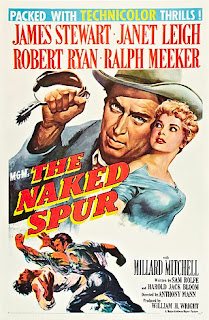The Naked Spur
When discussing Western noir, one has to discuss Anthony Mann. He and James Stewart made five Westerns in the 1950s that challenged the notion of what a Western could be. They have also been called "psychological Westerns," films made after the establishment of psychoanalysis became commonplace.
The Naked Spur, released in 1953, is notable for its economy--there are only five speaking parts. It touches on greed, a common film trope in any genre, and also on what motivates us to do the things we do.
Stewart plays a man who is tracking a killer. As he tracks him he comes across a grizzled old prospector (there is no other kind of prospector in movies), Millard Marshall. Stewart pays Marshall a small sum to help him, and they are ambushed by someone sending rocks crashing down of from the top of a cliff. A soldier (Ralph Meeker) happens along, and helps, and the killer (Robert Ryan) is captured. But he has along with him the daughter of an old friend, Janet Leigh.
Once Marshall and Meeker learn that Stewart is after a large reward for Ryan's capture, they demand to be cut in. Thus the remainder of the film is the trio taking Ryan back to Kansas, with Leigh tagging along, but nobody trusting anybody.
Later we learn that Stewart needs the money to buy back his ranch, which was sold out from under him by his woman while he was fighting in the Civil War. Ryan knows this, and uses it, and other psychological methods, to get the three men to turn on each other.
In spite of it taking place entirely outdoors (filmed in glorious Technicolor in the Rocky Mountains) The Naked Spur feels like a play, especially like dramas of the period, as by Arthur Miller. The tension is always there, even in quiet moments, such as when Stewart and Leigh have a chat and sound out their feelings for each other. But then Stewart can't know if Leigh is sincere or just trying to help Ryan escape.
The acting is wonderful. Ryan, in contrast to many of the other roles he played, makes his character a bemused fatalist, almost always laughing, but we can see that's a cover for what he's really thinking about--saving his own hide. Meeker plays his character as brash and just to the edge of obnoxious. Stewart, as with his other films with Mann, plays a character who is torn by his need for money (which is also a way to ease his shame) and simple human decency. I can't think of any other Western in which the hero breaks down in tears.
For any fan of Westerns, or indeed any movie fan, The Naked Spur is a must see.
The Naked Spur, released in 1953, is notable for its economy--there are only five speaking parts. It touches on greed, a common film trope in any genre, and also on what motivates us to do the things we do.
Stewart plays a man who is tracking a killer. As he tracks him he comes across a grizzled old prospector (there is no other kind of prospector in movies), Millard Marshall. Stewart pays Marshall a small sum to help him, and they are ambushed by someone sending rocks crashing down of from the top of a cliff. A soldier (Ralph Meeker) happens along, and helps, and the killer (Robert Ryan) is captured. But he has along with him the daughter of an old friend, Janet Leigh.
Once Marshall and Meeker learn that Stewart is after a large reward for Ryan's capture, they demand to be cut in. Thus the remainder of the film is the trio taking Ryan back to Kansas, with Leigh tagging along, but nobody trusting anybody.
Later we learn that Stewart needs the money to buy back his ranch, which was sold out from under him by his woman while he was fighting in the Civil War. Ryan knows this, and uses it, and other psychological methods, to get the three men to turn on each other.
In spite of it taking place entirely outdoors (filmed in glorious Technicolor in the Rocky Mountains) The Naked Spur feels like a play, especially like dramas of the period, as by Arthur Miller. The tension is always there, even in quiet moments, such as when Stewart and Leigh have a chat and sound out their feelings for each other. But then Stewart can't know if Leigh is sincere or just trying to help Ryan escape.
The acting is wonderful. Ryan, in contrast to many of the other roles he played, makes his character a bemused fatalist, almost always laughing, but we can see that's a cover for what he's really thinking about--saving his own hide. Meeker plays his character as brash and just to the edge of obnoxious. Stewart, as with his other films with Mann, plays a character who is torn by his need for money (which is also a way to ease his shame) and simple human decency. I can't think of any other Western in which the hero breaks down in tears.
For any fan of Westerns, or indeed any movie fan, The Naked Spur is a must see.



Comments
Post a Comment